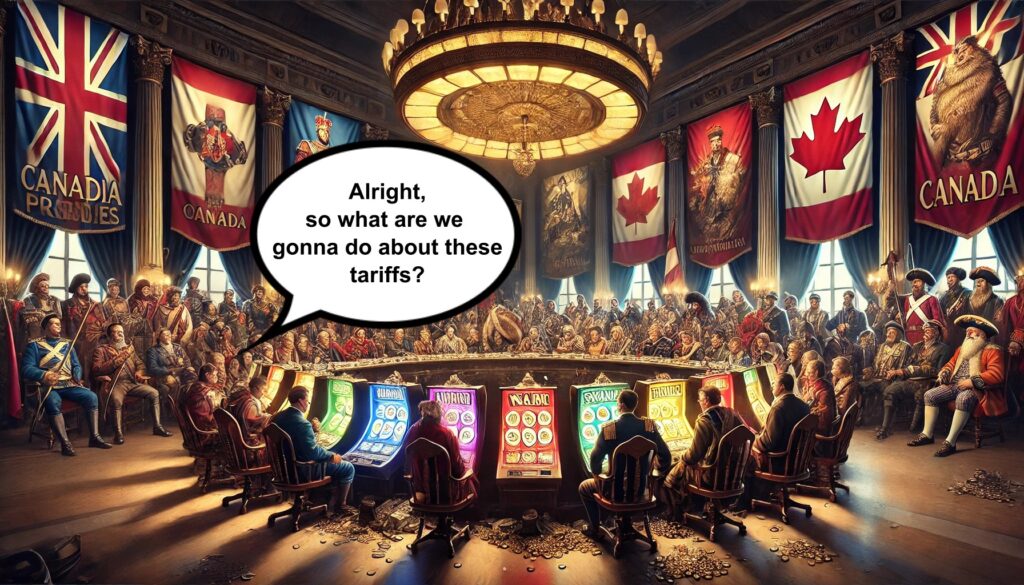Canada’s trade war with the U.S. continues to escalate, and provinces across Canada are implementing measures to reduce reliance on American goods. The rising conflict has the potential to reshape industries on both sides of the border and the gaming industry has not been immune to the fallout from the ongoing tensions.
Alberta has been the first province to explicitly ban the purchase of gaming equipment from American suppliers, and other provinces have taken similar steps. This article provides an overview of the measures being taken by Canadian provinces – and their respective gaming regulators – to reduce spending on American goods, and examines how the gaming industry as a whole could be affected.
Alberta
Following U.S. President Donald Trump’s fluctuating stance on tariffs, Alberta has taken decisive action, banning its gaming regulator, the Alberta Gaming, Liquor and Cannabis Commission (AGLC), from purchasing new video lottery terminals (VLTs) from American suppliers. The restriction took effect on March 6, 2025.
The AGLC clarified in a bulletin that it would prioritize procurement from companies based in Alberta, elsewhere in Canada, or countries with which Canada has a free trade agreement. However, Alberta will continue to source replacement parts for existing U.S.-made VLTs from American suppliers.
The impact of Alberta’s decision on the gambling industry remains to be seen. Analysts from Eilers & Krejcik Gaming (EKG) estimate that Alberta represents about 4% of total U.S.-made gambling machine sales. However, if other Canadian provinces implement similar restrictions, the impact could be more significant. Canada accounts for approximately 15,000 units, or 16% of the combined U.S. and Canadian sales, meaning a broader ban could put significant pressure on American VLT manufacturers.
British Columbia
British Columbia Premier David Eby has responded to the tariffs, vowing that the province will not back down. As of March 4, B.C. Liquor Stores have stopped selling and ordering “red-state liquor products.” Additionally, the provincial government, including Crown corporations – like B.C.’s gaming operator the British Columbia Lottery Corporation (BCLC) – have been instructed to prioritize Canadian-made products over American ones.
Saskatchewan
In Saskatchewan, Premier Scott Moe has announced that the province is taking strong retaliatory measures in response to U.S. tariffs, directing the Saskatchewan Liquor and Gaming Authority (SLGA) to stop purchasing American-made alcohol and prioritizing Canadian suppliers for government procurement. Furthermore, Lotteries and Gaming Saskatchewan (LGS) has been instructed to redirect $43 million in spending on VLT and slot machine upgrades to non-U.S. suppliers.
Manitoba & Nova Scotia
Manitoba and Nova Scotia, while not explicitly instructing their gaming regulators to stop buying American products, have introduced broader measures that aim to curb how government funds are spent on American goods. Premier Tim Houston of Nova Scotia has prohibited American companies from bidding on provincial business, and the province is “actively seeking options to cancel existing contracts and reject bids outright.” Meanwhile, Manitoba Premier Wab Kinew introduced the Buy Canadian Act, which amends the Government Purchases Act to establish a “Buy Canadian” policy across the government and allows for preferential treatment to be given to Canadian suppliers when purchasing goods.
Ontario
At the provincial level, Ontario has banned American companies from bidding on public contracts. Additionally, Premier Doug Ford has suggested implementing a 25% surcharge on electricity exports to three U.S. states (though that initiative is currently on hold). Several Ontario municipalities, including Vaughan and Mississauga, have tightened procurement policies to favour Canadian suppliers. Meanwhile, and potentially most impactfully, Ontario has also taken steps to restrict the sale of American alcohol. Notably, Ontario’s gaming regulator – responsible for the sole licensed iGaming regime in Canada – has not announced any measures related to the ongoing trade dispute.
The city of Toronto is also taking decisive action in response to the U.S. trade war, implementing a 10-point plan to support Canadian businesses and workers. Mayor Olivia Chow announced key measures, like prioritizing Canadian suppliers in city procurement. Additionally, American-based suppliers may be ineligible to bid on new municipal contracts, with purchases under $353,000 for goods and services and $8.8 million for construction reserved exclusively for Canadian businesses. The city is also launching a “Love Local” campaign to encourage residents to choose Canadian-made products.
To ease financial strain, Toronto will allow industrial property owners impacted by tariffs to defer taxes for six months, from June 1 to November 30, without penalties or interest. Additionally, Toronto Fire Services is shifting its procurement strategy, purchasing 17 Canadian-made fire trucks instead of sourcing from the U.S.
What does this mean?
As demonstrated, the gaming industry has already been impacted by the fallout of these escalating trade tensions. Several provincial regulators have committed to sourcing gaming equipment from non-American companies, with broader “buy Canadian” mandates being established across many government-run institutions.
The deepening trade dispute between Canada and the U.S. is more than just political posturing – it has real consequences for businesses, workers, and consumers. While Canadian provinces are making bold moves to counter U.S. tariffs, these measures won’t come without cost. Higher prices, disrupted supply chains, and economic uncertainty could ripple across industries, affecting everything from gaming to manufacturing. As both countries double down on protectionist policies, the bigger question remains: How long can this standoff last before everyone loses?




